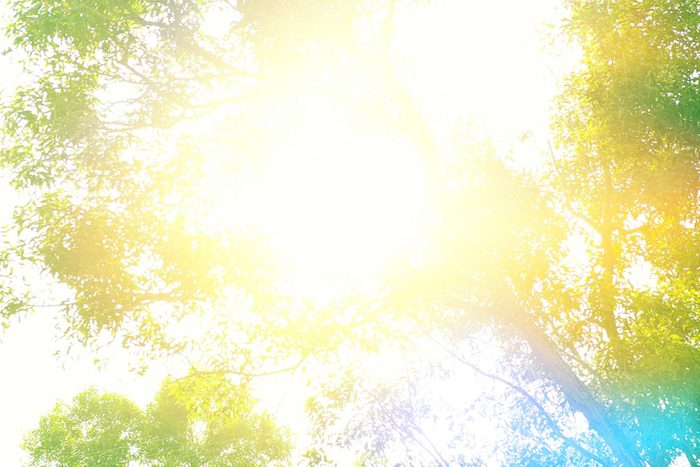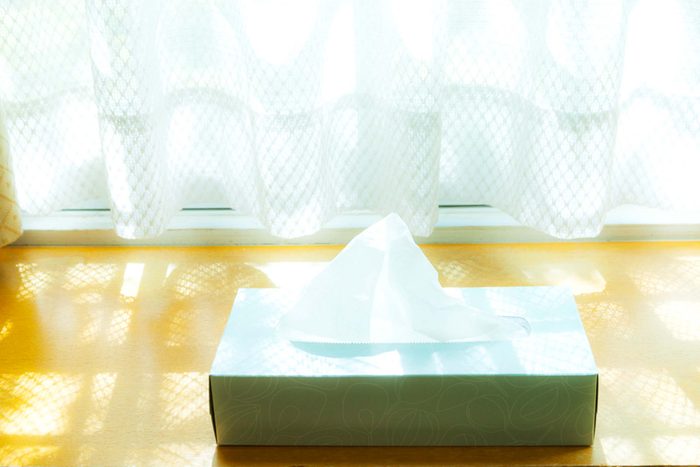
Can SAD happen in the summer?
One of the many things therapists wish you knew about seasonal affective disorder (SAD) is that it’s not limited to winter—summer SAD is real. Here’s how to tell if you might be suffering from SAD and what you can do to beat it.

You’re depressed every summer—year after year
“The symptoms of summer onset of seasonal affective disorder (SAD) are similar to those of normal depression, but they are relieved during the fall and winter months and return annually during the spring and summer months,” says Julienne Derichs, a Licensed Clinical Professional Counselor in private practice at Couples Counseling Today in Highwood, Illinois. Just like winter-onset SAD, summer seasonal affective disorder returns each year at about the same time. (Here are 11 ways to beat the symptoms of SAD.)

You can’t adjust to the summer routine
Schedules shift in summer—the kids are off, vacations are more frequent—and that change in routine can throw a monkey wrench into your mood. The sudden summertime schedule change may trigger summertime SAD says Helen Odessky, a clinical psychologist and author of Stop Anxiety from Stopping You.

You feel pressure to be happy
Every advertisement, every billboard, and every summer dress and smiling face reminds us: Summer equals fun. “Since everyone around you is happy, this can put extra focus and stress on your own feelings of depression,” says Jephtha Tausig, PhD, a licensed clinical psychologist in New York City. “You think to yourself, ‘I should be feeling happy, but I’m not. What’s wrong with me?'” While most people are enjoying the warm temperature and outdoors, sufferers feel alone in their disorder.

Depression runs in the family
Whether its nature (genetic) or nurture (learned through a childhood of exposure), depression and its related mood disorders—including SAD—tend to run in families. Take a look at your parents and siblings—do they dread sunshine and the beach? “Researchers think that SAD may have a genetic component; more than two-thirds of patients with SAD have a relative with a major mood disorder,” says Derichs. (These are the other types of depression you didn’t know you could have.)

You’re getting too much sunlight
Sunlight and dark help regulate the natural rhythms of your body—especially melatonin, a hormone the body produces at night. If you’re in the sun all day and then on your phone, tablet, or computer before bed, that extended exposure to bright light could be suppressing the release of this crucial sleep hormone. That’s why one summer SAD theory posits that too much sun disrupts melatonin production, says Derichs.

You’re not getting regular sleep
Your body’s systems follow a 24-hour series of patterns—your temperature, your metabolism, and your sleep are all dependent on your circadian rhythms, as these patterns are known. “If people stay up later in the summer, it could throw their sensitive circadian rhythms off,” says Derichs. Poor sleep is a risk factor for depression, so if you sleep poorly or significantly less in summer, you could be opening the door to SAD. (Try these tips for getting a sounder, longer full night of shut-eye.)

You live in the South
No one is sure why, says Derichs, but “people in southern U.S. states tend to experience summer SAD more so than those in the north.” Considering that the lower latitudes experience higher temps and warmer nights (which can equal worse sleep), it starts to make sense that the risk may be higher below the Mason-Dixon Line.

Your allergies are acting up
“New research has shown a link between allergies and depression,” says Dr. Tausig. “Reports suggest that the risk of depression in people with severe allergies is twice of those without.” With plants blooming throughout the season, more time outdoors, and open windows, summer can be especially hard on people with environmental sensitivities; the irritants may cause inflammation in your brain, which has been linked to bad moods and depression.

You can’t bear being bare
Summer bathing suit fears are no joke: “If you have body dysmorphic issues around swimsuits or skimpy summer clothes, then every day is a reminder that you [think you] look bad,” says Bruce Cameron a licensed counselor and psychotherapist in private practice in Dallas, Texas. “This can drive folks into a bad mood and it stays until they can cover up again in chilly weather.” (Learn about all the benefits of accepting yourself and your body.)

Beating summer SAD
If you suspect you have summer SAD, start by seeing a trained therapist, says Derichs. She also recommends the following strategies along with these ways to avoid SAD:
- Get regular exercise early in the day
- Stay out of the sun and heat
- Make nighttime sleep a priority
- Drink plenty of water and eat a healthy diet focused on fruits and vegetables
- Be proactive; passivity can increase stress. “We all need to feel like we have a sense of control over the things that happen in our lives; the act of taking control is in itself empowering,” says Derichs.
- Be social; a good support system can help you see things from a different point of view.
- List three positive things that have happened each and every day, and reflect on what led to them. “Focusing on happiness changes people’s perspectives by opening them up to positive emotions.”

